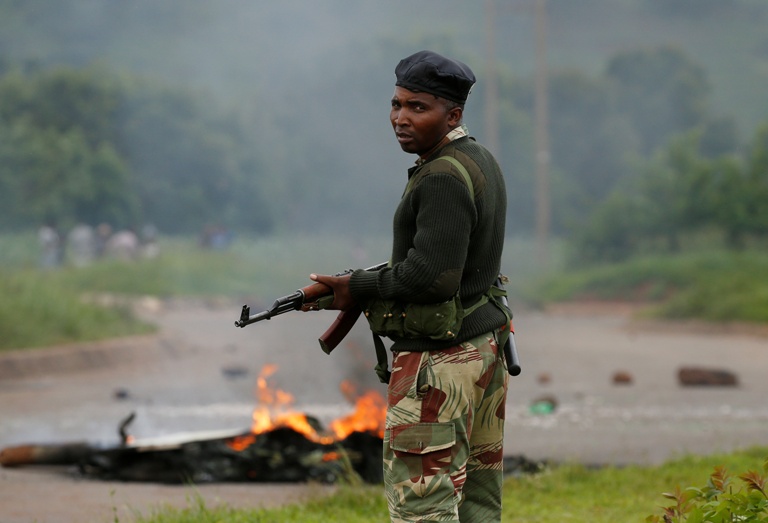
Soldiers Patrol Zimbabwe Streets After Deadly Protests Over Economy
HARARE – Soldiers patrolled Zimbabwe city streets on Tuesday and confrontations with angry civilians threatened to boil over, as the government offered public workers more money a day after protests over a disintegrating economy turned deadly. Monday’s unrest, in which several people died, followed sharp hikes in fuel prices decreed by President Emmerson Mnangagwa. The […]

HARARE – Soldiers patrolled Zimbabwe city streets on Tuesday and confrontations with angry civilians threatened to boil over, as the government offered public workers more money a day after protests over a disintegrating economy turned deadly.

Monday’s unrest, in which several people died, followed sharp hikes in fuel prices decreed by President Emmerson Mnangagwa.
The South African government’s news service said: “Mnangagwa’s announcement of a 150% increase in fuel prices was greeted with shock in Zimbabwe, where unemployment is estimated at 80%. The price was increased from US$1.34 for a litre of petrol to US$3.31 with diesel surging to US$3.11 per litre.”
According to Reuters, Zimbabweans accuse President Mnangagwa of failing to live up to pre-election promises to kick-start growth, having seen their purchasing power eroded by rampant inflation.
As security forces faced accusations of heavy-handedness and more protests threatened to break out, Labour Minister Sekai Nzenza said public workers would get a monthly supplement of between 5 and 23 percent of their salaries from January to March while wage negotiations with unions continued.
Mnangagwa, absent on an official visit in Moscow, said Zimbabwe was interested in receiving Russian loans and might need Russia’s help in modernising its army, RIA news agency reported.
The president has also promised a clean break from the oppressive regime of long-term leader Robert Mugabe, who he forced out in a de facto coup in November 2017.
In Harare and Zimbabwe’s second city Bulawayo, banks, schools, businesses and the stock market remained shut on Tuesday as many residents stayed at home.
Security forces deployed to stave off further demonstrations, witnesses said, and people in the capital said they could no longer access the Internet.
“We are suffering. Mnangagwa has failed this country. Enough is enough, we no longer want this,” said protester Takura Gomba in Warren Park, a Harare township, retreating with a group of others as soldiers approached in trucks.
A human rights lawyers’ group said it had received reports of soldiers and police breaking into homes in townships overnight and assaulting suspected demonstrators.
Defence Forces spokesman Overson Mugwisi, police spokeswoman Charity Charamba said they could not immediately comment, as did the country’s three mobile telecoms firms.
‘ROAD TO NOWHERE’?
Piers Pigou, a southern Africa consultant at the Crisis Group think-tank in Johannesburg, said the government – which blamed the opposition and rights groups for Monday’s violence – appeared to be on a “road to nowhere”.
“They have completely lost control over the economy,” he said.
“…We could be looking at a security crackdown that mutes protests, for now… There is a clear sense of anger among the youth population who had high expectations when Mugabe left and have been left deeply disappointed.”
Mnangagwa – a one-time protege of Mugabe who served the post-independence leader as defence and state security minister – faces a daunting task in tackling Zimbabwe’s worst economic crisis in decade.
In an echo of the Mugabe era, less than $400 million in cash is circulating in the financial system, forcing many to buy dollars at a premium, driving inflation above 30 percent and triggering shortages of fuel and drugs.
Following Monday’s clashes, in which the government said several people died and some 200 were arrested, the Zimbabwe Congress of Trade Unions called for three days of stay-at-home protests.
That did not stop protesters from gathering again, however.
In Kuwadzana township on the outskirts of Harare, riot police blocked demonstrators from marching into town and an army helicopter fired tear gas to disperse them, witnesses told Reuters.
The Zimbabwe Lawyers for Human Rights (ZHLR) said it had received distress calls from residents in Harare’s Mabvuku and Chitungwiza who were forcibly taken from their homes on Monday and made to remove barricades from roads – a tactic used by Mugabe’s security agents.
“Of concern is the involvement of soldiers in these illegal acts who are actively participating in the cruel and inhuman treatment of residents,” ZLHR said in a statement.
A Bulawayo-based journalist told Reuters that police had fired tear gas in the township of Cowdray Park on Tuesday, to stop protesters from looting some shops. South African state broadcaster SABC reported widespread looting in the city.
SANews.gov.za said the protests came just after doctors ended a 40-day strike in the country without coming to any terms.
The Zimbabwean government issued a statement in response to the protests, labelling them Western-sponsored acts.
“This brazenly unconstitutional plan, which has sought financial support from some regime-change organisations based in America and Germany, among other countries, represents a serious threat to our consolidating democracy, to the rule of law in our country, and to the authority of government and the state,” the statement said.
(Reporting by MacDonald Dzirutwe; Additional reporting by Joe Brock in Johannesburg; writing and editing by John Stonestreet; Additional news from SANews.gov.za and editing by Jenni Baxter)
